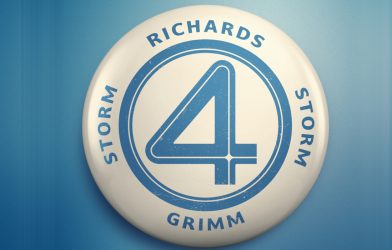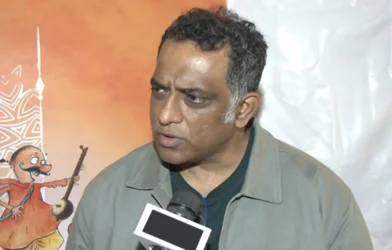Written by Victoria Male
There seems to be a disconnect in Hollywood at the moment. While most millennial and Gen Z audiences prefer original content over franchises and remakes, (according toa studycommissioned by Tubi) it seems that everything on our screens, both big and small, seems to be based on something else – whether it be a book, podcast, documentary, or someone’s life.
The reason for this is if a movie or series is adapted from an existing piece of media, it’ll have a built-in audience and make a safer bet to invest the considerable amount of time and money it takes to make a feature or TV show.
It’s a frustrating conundrum if you’ve written original material – you’ve supposedly given the audience what they want, however, it’s difficult to get it made by the powers that be as the industry slowly and cautiously rebounds from last year’s strikes.
The good news is studios and production companies are expanding where they mine IP (intellectual property). In addition to the traditional avenues of scouting books and articles as well as acquiring individual’s life rights to adapt for the screen, podcasts have become bona fide fodder for the movies and television. Hulu’s The Dropout and Peacock’s Dr. Death are two of the many series based on podcasts, and even Kevin Smith’s horror-comedy Tusk had audio roots.
Another avenue that is oft-overlooked are short stories. Some of the most famous films were adapted from short stories: All About Eve, The Curious Case of Benjamin Button, Arrival.
While optioning a best-seller or hit-podcast can be expensive, time-consuming and laborious, it’s easier to generate your own IP from your existing material than one may think!

SCREENPLAY TO SHORT STORY
Creating a short story version of your screenplay has several benefits. Firstly it’s quicker than writing a book and a more appealing length to a beleaguered development executive. Furthermore, publishing your story before sending it out to the film community can serve as external validation for the piece.
I’ve adapted three screenplays into short stories, which have been published in nine literary magazines worldwide. The most straightforward approach for me when going from a sixty or one hundred page script to a short story that can range from one to ten thousand words is to
select a scene in your screenplay that you can adapt as a self-contained story. Likely, it’ll be a pivotal part of your script, therefore a scene that falls around an act break or midpoint is a good place to pull from. You want to find a snippet of your script that encapsulates the main conflict of the script. This way it can function as a successful standalone story as well as a preview of what the entire script will entail.
I took the midpoint scene from my screenplay CADER IDRIS to be the basis of my short story “The Crone of Cader Idris”. Cader Idris is about a man, Morgan, who while grieving a major loss goes camping on a Welsh mountain with a dark legend. However, his weekend trip becomes a deadly struggle where he must vanquish both his own and the mountain’s demons or else succumb to its curse. Throughout the movie, Morgan meets several monsters based on Welsh mythology as he reconciles his grief and guilt. For the short story, I chose the sequence where
Morgan meets one monster, the witch Matilda of the Night, and is chased by her for the basis of the narrative.
The biggest difference, in my opinion, between a screenplay and prose is how much detail you can put on the page. With a screenplay, it’s all about the economy of words. You’re trying to communicate as much as you can about the story and its characters in the least amount of space, while laying a foundation for all of the artisans who will bring the script to life on screen. Conversely, with a short story and prose in general, you are solely generating everything about the story.
In a screenplay, you learn about a character through behavior, subtext, and dialogue (or perhaps lack thereof) and that provides the depth as the script unfolds. In a short story, while you might not have as much space as a screenplay, you can go much deeper right off the bat through their descriptions and access to their thoughts. It’s my rule of thumb when writing a character in a script that you can’t write anything for a character that an actor can’t play.
In a short story, that limitation doesn’t apply. Illuminating a character’s thoughts in prose allows one to get to the heart of a character more quickly and therefore, condense the time it’ll take to learn about a character. It’s incredibly freeing after screenwriting for as long as I have, and writing in prose about your characters can be a great way to discover things about them for your script too.
Though it can feel laborious to delve into all the details of a scene when going from script to short story, prose also opens up the opportunity to dive so much deeper into your characters’ inner-lives.
When writing “The Crone of Cader Idris” I really enjoyed exploring Matilda’s inner-monologue in the piece. Whereas in the screenplay version, we see her solely from protagonist Morgan’s point of view. Re-imagining the story in prose allowed me to give Matilda a richer backstory and discover so much more about her. In turn those discoveries serve as helpful color for the director, actor, character designers, and others down the line when bringing Matilda to life on screen.
“The Crone of Cader Idris” condensed a ninety page script into just over three thousand words, and found publication in The Chamber Magazine, All Existing Literary Magazine, and Bards & Sages Quarterly.

PILOT TO PODCAST
Adapting from podcast to pilot is always going to be a larger jump since you’re going from an exclusively audio medium to an audiovisual one.
Furthermore, when I was adapting my podcast Your Biggest Fangirl into a series, I was also going from a non-fiction, interview style podcast to a narrative series. In that case, it was most important to me to retain the themes and the mission of the podcast when writing the pilot. During the three years I co-created, produced and hosted the Your Biggest Fangirl Podcast, I learned so much about how women expressed their fandom, whatever it may have been – Supernatural, Doctor Who, wrestling, even collecting pins.
The people we spoke to were scholars, writers, a rocket scientist, entrepreneurs, and actors. I felt that up until now, “fangirls” have always been portrayed in the media as silly, hysterical devotees or Kathy Bates in Misery, and in my reality, it couldn’t have been further from the truth.
My motivation for the podcast and the series was the same – to broaden the definition of fangirl women and show them as real people. Therefore, when creating the character of Evie, my fangirl protagonist in the series, I took all that knowledge I gained from talking to my interviewees to craft a three-dimensional woman.
Much like in the podcast, I wanted to show why she loved her celebrity crush so much, and what that did for her, whereas on the podcast I could simply directly ask why someone connected with a piece of media in the way they did. I think it’s important to get really clear on your “why” when adapting across mediums and to be fluid on your “how”, since when shifting platforms, your storytelling will inevitably shift and change.
Getting specific on your “why” and main themes when going from podcast to pilot is also important because instead of fleshing out a scene from a screenplay, you’re likely condensing several hours of a podcast into a thirty or sixty page script.
I was only able to convert the fifty-three episodes of the Your Biggest Fangirl Podcast into a thirty-page dramedy pilot by having a crystal clear message I wanted to convey: that there’s more that meets the eye to your average fangirl.

SUMMING IT UP
Despite the weird moment in the industry right now, hopefully reverse engineering your own IP allows one the best of both worlds.
Not only does making IP for yourself make your work more competitive without sacrificing creativity, it also can be a great exercise in delving deeper into theme and character in your existing scripts!









